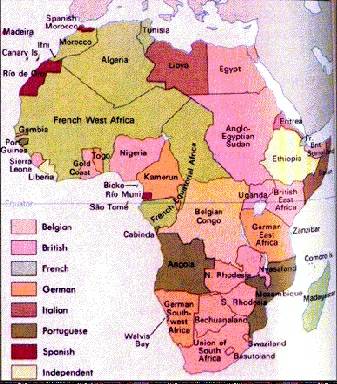|
PinkMonkey Online Study Guide-World History
10.4 Imperialism in Africa
Several European explorers inaugurated the European
penetration into the "Dark Continent." The most prominent
among them were:
-
David Livingstone, a Scottish physician, who
went to Africa in 1840, as a Protestant missionary.
-
Henry Stanley an Anglo-American journalist
who went in search of David Livingstone.
-
Karl Peters, a German student of British colonial
activities.
-
An Englishman Cecil Rhodes, an outstanding
African ’empire-builder.’
Further, Baker, Burton, Grant and Speke explored
the courses of the four great rivers the Nile, the Niger, the Congo
and the Zambezi. Henry Stanley also described these explorations
in his books: How I found Livingstone, Though the Dark
Continent and In Darkest Africa.
King Leopold II of Belgium organized in
1878, a private commercial company, under the name of the International
Africa (Congo) Association. He was the president and the chief
stockholder. The purpose was the purchase of Congo land for the
exploitation of rubber resources. The king then secured international
sanction, at the Berlin conference (1884-1885) for transforming
the Company’s lands into the Congo Free State, with himself as its
personal sovereign. He earned great profits in this undertaking.
By 1908, the government of Belgium took over the Congo Free State
as a Belgian colony, on payment of liberal financial compensation
to Leopold II.

Exhibit 10.1
European occupation of Africa
Many European nations such as Portugal, Spain,
Italy, France and Germany entered a race to acquire lands in Africa,
owing to its valuable resources.
-
Portugal established its hold over the
province of Angola, to the South of the Belgian Congo. It also
founded the colony of Mozambique, which came to be known as
Portuguese East Africa.
-
Spain acquired Morocco, the Canary Island,
islands on the Guinea Coast, Rio Muni, and Rio de Oro.
-
In 1889, Italy acquired the small territories
of Eritrea and Somaliland, on the East Coast of Africa. It also
acquired Tripoli and Cyrenaica, by defeating Turkey in 1911-1912.
-
France established a protectorate over Tunis
in 1881 as well as over Morocco. On the West Coast of Africa,
Senegal was already under the control of France. It conquered
Upper Nigeria in 1882 and Tibactoo in 1894. The French also
carved out a big state in the Congo Valley, under the name of
the French Congo.
-
England acquired the Cape Colony in South Africa.
In 1875, Disraeli purchased 176,000 shares of the Suez Canal
Company from the Khedive of Egypt, with the idea of securing
dominant control over the hundred-mile long Suez Canal. England
established a protectorate over Egypt.
-
In 1884, the German Karl Peters acquired Eastern
African lands, which took the shape of Africa, lying between
British Uganda and British Rhodesia. The Germans established
three other protectorates, namely (a) German South-West Africa,
lying on the west of British South Africa; (b) Cameroons on
the South of the Congo and (c) Tologand.
The Boer Wars in South Africa
The Boers opposed the British rule in the Cape
Colony, especially after 1833, when the British government made
slavery illegal in the Cape Colony. This forced the Boers to emigrate
from the Cape Colony. Piet Retief and his followers established
the Republic of Natalia. In May 1842, British forces invaded the
Republic of Natalia and converted it into a British colony. From
Natal, many Boers again trekked northwards to the Orange River,
where they established two states, namely Transvaal and the Orange
Free State, respectively. However, as a result of the Anglo-Boer
War (1899-1902), both Transvaal and the Orange Free State became
British colonies.
British colonialists under the leadership of Cecil
Rhodes acquired three British protectorates namely Basutoland, Bechuanaland
and Swaziland. By 1888 they founded British, East Africa and by
1894, they took Uganda. Nigeria was acquired by the Royal Niger
Company between 1886 and 1889.
Thus in the span of forty years, the whole of the
Dark Continent (except Ethiopia and Liberia) was divided between
the European powers.
[
next page]
|
Index
10.0 - Introduction
10.1 Meaning
10.2 Causes
10.3 Forms and Techniques of Imperialism
10.4 Imperialism in Africa
10.5 Imperialism in Asia
10.6 Significance and Consequences of Imperialism
10.7 Points to Remember
Chapter 11
|